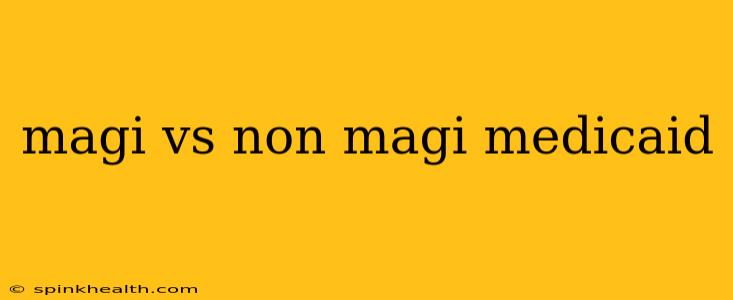Magi vs. Non-Magi Medicaid: Navigating the Eligibility Maze
The world of Medicaid can feel like a labyrinth, especially when you encounter terms like "MAGI" and "non-MAGI." These terms refer to different ways states determine Medicaid eligibility, and understanding the difference is crucial for anyone seeking healthcare coverage. Let's unravel this mystery together, using a storytelling approach to make it clear and engaging.
Imagine two families, the Millers and the Joneses. Both are struggling financially and need Medicaid to cover their healthcare costs. The crucial difference lies in how their states determine eligibility: one uses the Modified Adjusted Gross Income (MAGI) system, and the other uses a non-MAGI system.
What is MAGI Medicaid?
The Miller family lives in a state that uses the MAGI system. This means their eligibility is largely based on their household income. Think of it like this: the state uses the same income information reported on your federal tax return (your Adjusted Gross Income or AGI), but it's modified to account for certain deductions and tax credits not relevant to Medicaid eligibility. The state looks at this modified income, comparing it to the federal poverty level (FPL). If their MAGI is below a certain percentage of the FPL, they qualify for Medicaid. It's a relatively straightforward process, based primarily on income.
What is Non-MAGI Medicaid?
The Jones family resides in a state that utilizes the non-MAGI system. This approach is far more complex. While income is still a factor, states using non-MAGI methods often consider a broader range of factors beyond income. These can include:
- Resources: This includes assets like savings accounts, stocks, bonds, and the value of a home. The state might place limits on the amount of resources a family can possess to qualify.
- Household size: A larger family might have higher income thresholds for eligibility compared to a smaller family.
- Disability or other qualifying conditions: Some states prioritize certain populations, such as pregnant women, children, or individuals with disabilities, even if their income exceeds the typical MAGI thresholds.
- Immigration status: Immigration status can play a role in some non-MAGI states.
The Joneses find that navigating their state's eligibility requirements is a much more complicated process, requiring careful documentation and thorough review of various factors.
Frequently Asked Questions
Here are some common questions people have about MAGI and non-MAGI Medicaid:
1. Which system is better, MAGI or non-MAGI?
There's no single "better" system. MAGI is generally simpler and easier to understand, with eligibility primarily determined by income. Non-MAGI offers more flexibility for states to tailor eligibility to specific populations and circumstances, but this flexibility can also lead to greater complexity.
2. How do I know which system my state uses?
The best way to determine which system your state uses is to visit your state's Medicaid website. The information is usually clearly stated on their eligibility page.
3. What if my income is just above the MAGI limit?
If your income exceeds the MAGI limit, you might still qualify for Medicaid if your state offers a Medicaid expansion program under the Affordable Care Act (ACA). Some states expanded Medicaid to cover more individuals, while others didn't. Your state's healthcare marketplace might also offer affordable healthcare coverage options through subsidies.
4. Are there resources to help me navigate the Medicaid application process?
Absolutely! Many organizations offer assistance with Medicaid applications. Contact your state's Medicaid agency, local health departments, or non-profit organizations serving low-income individuals for guidance. They can help you understand the eligibility requirements and assist with the application process.
5. Can my immigration status affect my eligibility?
This varies greatly depending on both your state's system (MAGI or non-MAGI) and federal immigration laws. Some states have stricter requirements for immigrants than others. Again, consulting your state's Medicaid website or seeking assistance from a qualified organization is crucial.
Navigating the Medicaid system can be challenging, but understanding the difference between MAGI and non-MAGI is the first step towards securing the healthcare coverage you need. Remember to research your state's specific guidelines and seek assistance when needed. Your health deserves it.

